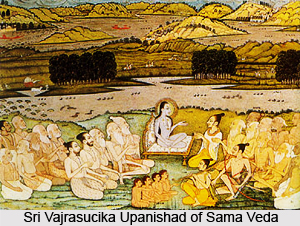 Rites of Sama Veda are mainly `samans` or chants, which were derived from some of the texts of the `Rig Veda`. Sama Veda is a rich collection of innumerable hymns which possess a musical harmony commonly found in musical notes. The rituals of Sama Veda were actually intended for priests who used to perform `soma` ceremonies. Gradually, with the passage of time, the several rites of Sama Veda became more complicated. This encouraged the systematic compilation of the chants, hymns and the `Mantras` into a book, which enabled priests to obtain a source of reference for the rituals and rites.
Rites of Sama Veda are mainly `samans` or chants, which were derived from some of the texts of the `Rig Veda`. Sama Veda is a rich collection of innumerable hymns which possess a musical harmony commonly found in musical notes. The rituals of Sama Veda were actually intended for priests who used to perform `soma` ceremonies. Gradually, with the passage of time, the several rites of Sama Veda became more complicated. This encouraged the systematic compilation of the chants, hymns and the `Mantras` into a book, which enabled priests to obtain a source of reference for the rituals and rites.
Myth behind Sama Veda
Pushkara in Agni Purana has discussed the rites which have been involved in the Sama Veda. He has narrated to Lord Rama that a man, by repeating the Sanhita known as the `Vaishnabi`, is sure to witness the realisation of all his wished for objects.
Types of Rites in Sama Veda
The aim of the Sama Veda was a practical one that is to act as a book of songs for `singer priests`. The rituals of Sama Veda were accompanied by hymns sung by a priest. This singing priest was known as `udgai`, obtained from a Sanskrit term meaning `to sing`. These hymns used to be sung in certain pre-determined melodies. Agni Purana states that a man in prison would be liberated by repeating the Mantra running as Agni Stigma, etc. A man having committed the sin of selling improper articles should repeat the Mantra running as `Ghritavati` etc. A repetition of the Mantra running as `Ayano Deva Savitri`, etc., tends to neutralise the effects of a bad dream. Similarly a man, by constantly reciting the `Sarpa Saman`, becomes safe from snake bites.
`Going of the cows ceremony`, `soma` ceremonies and the numerous other rituals of the Sama Veda, performed by the `Brahmanas` lasted for about one to 12 days. There were also certain rituals which were conduct to compensate the errors occurring during some sacrifices. Majority of the rites of Sama Veda are agricultural rites.
Incantations or Mantras of Sama Veda
It has been said that a man by repeating the `Chhandasi Sanhita`, is sure to win the good graces of the god `Shankara`, while by repeating those respectively known as the `Paitri` and the `Skandi`, a man is sure to enjoy the greatest self-complacence. A repetition of the Mantras running as `Indram Bhajamahe` destroys the evil effects of dreadful incantations practised against a man.
Agni Purana states that a man seeking the love of a particular woman, should recite into her ears the Samans running as `Paripriya`, `Hi Yah Karih`, etc. whereby he would surely win her affections. A man, by daily repeating the eight verses known as the `Vairupyas`, is sure to become the master of bounded wealth, whereas by repeating the `SapSashtakas` a man is enabled to witness the realisation of his heartfelt desires. A man, having subjugated his senses, should worship the cows, each morning, with the verses beginning as `Gavyashuna`, etc. whereby he would have numerous heads of cattle in his house.
Mantras or chants of Sama Veda are quite musical, which make them favourable to spiritual growth. They are chanted for praising the glory of the gods. The sings of Sama Veda are considered to be the foundation of the various `swaras` or notes which form the mail pillars of Indian music.
Homas
Similarly the Purana states that by performing a Homa ceremony with the Mantra known as the `Dirgha Tamasorka`, a man is sure to have plenty of boiled rice every day. If a man chants `Svamadhyanti`repeatedly, it is believed that he will never die of thirst. Similarly, by repeating the Mantra running as `Tvamima Oushadhi`, etc. never he fails sick. A man by practising the `Prati Deva Vrata` is sure to get rid of all fears.
It has been said that a man by casting oblations of vessels full (Drotias) of barley, soaked in clarified butter, into the fire, and by repeating the Mantras as `Vata Avatu`, etc., is enabled to cast off all charms and incantations. A man by performing a Homa ceremony with oblations of sesame and by repeating the Mantras known as `Pradeva Dasa` followed by `Voushats`, becomes an expert in all trades. Pushkara in the Purana has also narrated that A thousand libations cast into the sacrificial fire with the Mantras, running as `Vaskedhama`, etc. grants a victory in war.
Effigies of pasted rice should be made of horses, elephants, car-warriors and principal leaders belonging to the enemy`s forces, and should be cut with a razor by repeating the Mantras running as `Abhi Tva Shurananumo`, etc. after which the Brahmana engaged to practise the charm, should offer them, in anger, as oblations on the sacrificial fire, mixed with boiling oil. A performance of the rite described above, is sure to grant an easy victory in war. The Mantras known as the `Garuda`, the `Rathantara` the `Varnadevya` and the `Vrihadratha` should be deemed as undoubtedly the best of sin-expiating Mantras.



















